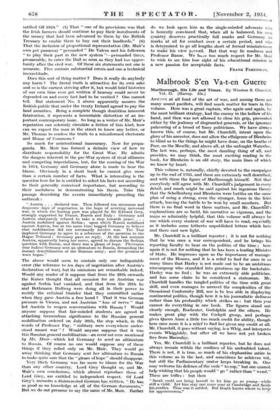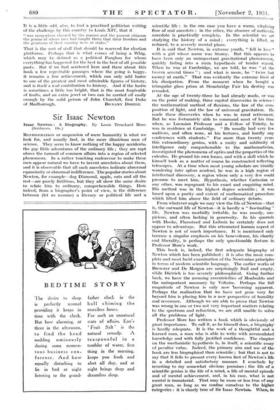Malbrook S'en Va-t-eri Guerre
Marlborough, His Life and Times. By Winston S. Churchill. Vol. II. (Harrap. 25s.) ANYONR at all fond of the art of war, and among them are many sound pacifists, will.find much matter for tears in this volume. Here was a great captain, who again and again, by the most brilliant strategy, had the enemy in the hollow of his hand, and then was not allowed to close his grip, prevented either by the jealousy of disgruntled generals, or the ignorant palavering of a brood of fussy politicians. We have always known this, of course, but Mr. Churchill, intent upon the glory of his ancestor, does not allow the effulgence of Blenheim to blind us to the things he might have done, on the heaths of Peer, on the Moselle, and above all, at the unfought Waterloo. The last was, perhaps, the most dazzling thing of all, and provides, we may think, the most exciting reading in the book, for Blenheim is an old story, the main lines of which we know by heart.
This volume is, naturally, chiefly devoted to the campaigns up to the end of 1705, and these are extremely well described, and with them the figure of Marlborough himself. Not that everybody will agree with Mr. Churchill's judgement in every detail, and much -might be said against his ingenious theory that the Schellenberg and Blenheim were battles on the same plan of using a strong, even the stronger, force in the feint attack, leaving the battle to be won by small numbers. But there is no final word in these matters, and Mr. Churchill's explanations are so lucid, his narrative so vigorous, and the maps so admirably helpful, that this volume will always be one which every student of war will have to read, especially as it includes some hitherto unpublished letters which here and there cast new light.
Mr. Churchill is a brilliant reporter ; it is not for nothing that he was once a war correspondent, and he brings his reporting faculty to bear on the politics of the time ; here again it is not for nothing that he has been a leading Minister of State. He impresses upon us the importance of manage- ment of the Houses, and it is a relief to find for once in so many times that Harley is not made out to be an ambitious nincompoop who stumbled into greatness up the backstairs. Harley was no fool ;. he' was an extremely able politician, and has some claim to be considered a statesman. Mr. Churehill handles the tangled politics of the time with great skill, and even manages to unravel the complexities of the Occasional Conformity Bill, nor is he less able in displaying continental politics, though here it is his journalistic deftness rather than his profundity which strikes us : but then you cannot do everything in one book. The figures stand out clearly enough, Rochester, Godolphin and the others. He makes great play with the Cockpit group, and perhaps gives Queen Anne a little too much credit for ability, though here once more it is a relief to find her given any credit at all. Mr. Churchill, it goes without saying, is a Whig, and interprets events Whiggishly, but after all we have not yet broken free from Macaulay.
Yes, Mr. Churchill is a brilliant reporter, but he does not always remain within the confines of his undoubted talent. There is not, it is true, so much of his elephantine satire in this volume as in the last, and sometimes he achieves wit, but still the, Parliamentary orator keeps .breaking in. One may welcome his defence, of the verb " to cop," but one cannot help wishing that his people would " go " rather than " wend." These are trifles : but then " Sarah could not bring herself to let him go so young--while. still a Child.-- Lbt him stay ciiiiiiniore year at Cambridge and finisli his-studies. Thus was it settled. But Death luaows where to, keep his appointments." It is a, little odd, also, to find a practised politician writing of the challenge by this country to Louis XIV, that it " was everywhere cheered by the masses and the poorest citizens. the genius of whose race had taught them that their freedom and the greatness of their country were at stake."
That is the sort of stuff that should be reserved for election platforms. Perhaps that is what comes of being a Whig, which may be defined as a political Pangloss for whom everything has happened for the best in the best of all possible pasts. But if we find scattered here and there about this book a few regrettable passages where the going is boggy, it remains a fine achievement, which can only add lustre to one of the greatest and most admirable figures of history, and is itself a real contribution to history. And if the lustre is sometimes a little too bright, that is the most forgivable of faults, and an extra jewel or two can be carried off easily enough by the solid person of John Churchill, first Duke















































 Previous page
Previous page